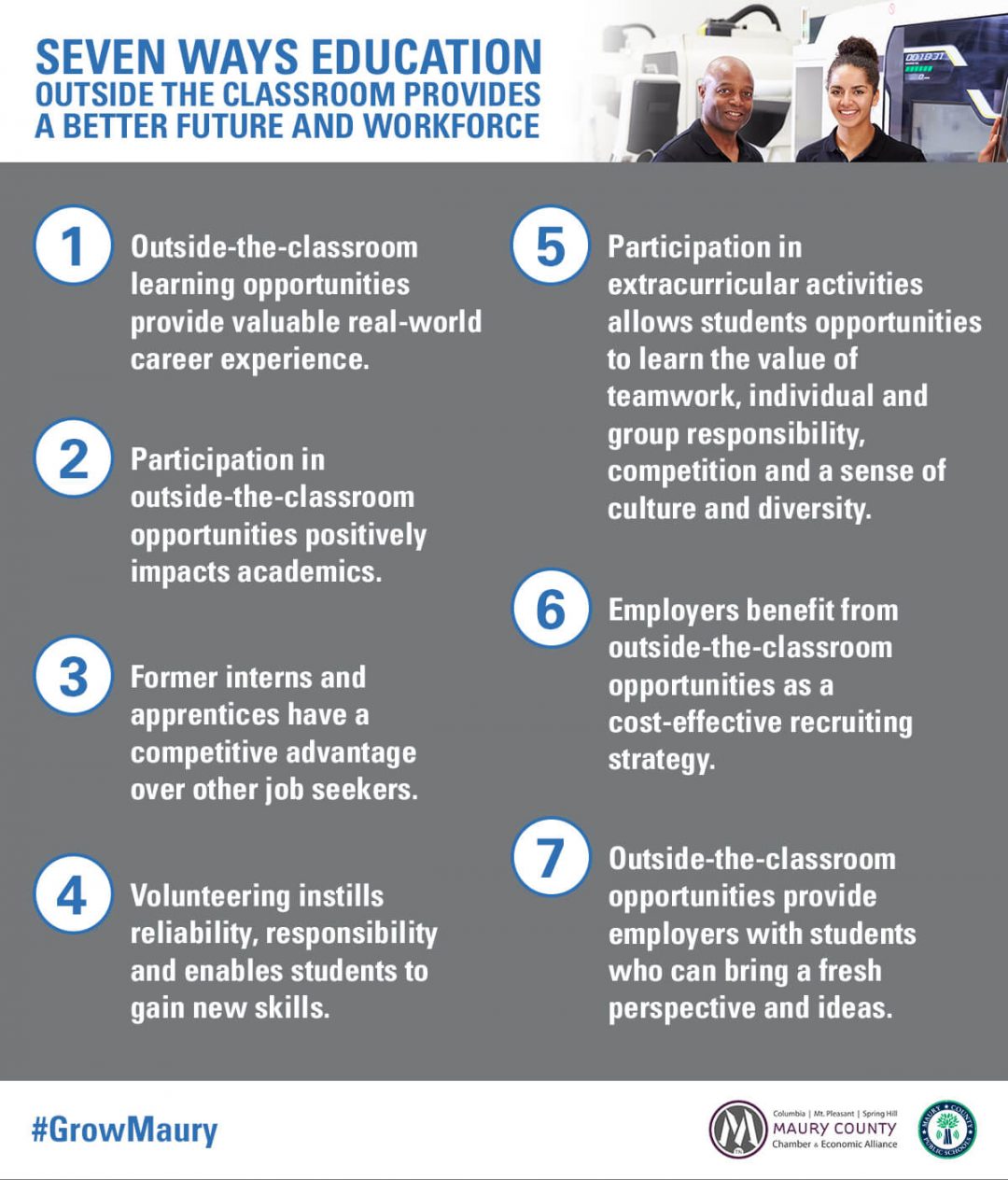By Dr. Chris Marczak, Superintendent of Maury County Public Schools
The ultimate goal of Maury County Public Schools (MCPS) is to equip students to achieve excellence in their next stage of life so they can become exemplary members of the workforce and community.
In early 2016, we introduced the MCPS “7 Keys to College and Career Readiness,” a list of educational goals for each student to reach in order to achieve his or her full potential. Studies show that students who hit these seven benchmarks are more likely to find success in college and the workforce.
This quarter, the Grow Maury Initiative, a pro-education strategic communications campaign in partnership with the Maury County Chamber and Economic Alliance, turns its attention to a new theme—Key Seven—work-based learning and education outside the classroom in preparation to graduation.
The Tennessee Department of Education finds that in a complex global economy, all students must be prepared with intellectual, technical and social skills needed to compete and contribute meaningfully to their communities. Outside-the-classroom opportunities like internships, apprenticeships, volunteering and extracurricular activities build on classroom-based instruction and are the ultimate step in ensuring career-readiness.
Work-based learning experiences outside the classroom provide a better future and workforce in these seven ways:
1. Outside-the-classroom learning opportunities provide valuable real-world career experience.
Opportunities like internships, apprenticeships, job shadowing and volunteering provide students with a unique inside perspective within their potential career field. This offers the chance for students to understand the relevance of their academic studies within real-world scenarios and can aid in the decision-making process students face when choosing a career. It can even help students determine what they don’t want to do for a career.
2. Participation in outside-the-classroom opportunities positively impacts academics.
The National Center for Education Statistics finds that outside-the-classroom learning experiences can boost attendance, academic achievement and aspirations for continuing education. These experiences enable students to learn in different settings, helping students to integrate, synthesize and apply knowledge which is essential to deep, meaningful learning experiences.
3. Former interns and apprentices have a competitive advantage over other job seekers.
Internships and apprenticeships build skills like professionalism, responsibility and experience in the field that provide a competitive advantage over other job seekers. These experiences also provide students with networking opportunities they can use in securing a job. Employers often will hire their interns and apprentices for full-time positions since they have already demonstrated capability.
4. Volunteering instills reliability, responsibility and enables students to gain new skills.
Volunteering can be advantageous in developing valuable workplace skills and training. Volunteering requires skills like reliability and responsibility, and can be a favorable addition to a resume. Serving as a volunteer also enables students to network, experience different career fields and it teaches a sense of philanthropy and giving back to the community.
5. Participation in extracurricular activities allows students opportunities to learn the value of teamwork, individual and group responsibility, competition and a sense of culture and diversity.
Students who participate in extracurricular activities, such as sports teams, band clubs and other group or team-related activities obtain skills that can be useful in the workplace. The Fortune Magazine article Want to succeed in business? Then play high school sports discusses how participation in high school sports helps students develop a host of crucial skills that give them a head start as they enter the workplace, and for decades after, providing long-term personal success and pro-sociability.
6. Employers benefit from outside-the-classroom opportunities as a cost-effective recruiting strategy.
Employing interns and apprentices allows employers to screen trainees while getting acquainted with their quality of work and performance. It facilitates their decision-making process when considering to whom they should extend an offer. Employers convert interns to full-time employees seamlessly, which reduces or eliminates any training-related costs. Internships and apprenticeships provide an ongoing pipeline of future employees.
7. Outside-the-classroom opportunities provide employers with students who can bring a fresh perspective and ideas.
Interns bring energy, new perspective and fresh ideas to the workplace which can augment the abilities of an employer’s workforce. Interns are good at questioning processes and can often discover a better way that a manager may not have realized. Employers can catalyze these innovative ideas through brainstorm sessions and encouraging interns to speak up during meetings.
Outside-the-classroom opportunities are a rewarding way for businesses and organizations to support students and education in Maury County, facilitating a positive future. Throughout this quarter, we’ll be sharing more studies, testimonials and examples that demonstrate the value work-based learning outside of an academic setting can bring to students, employers and the community.

